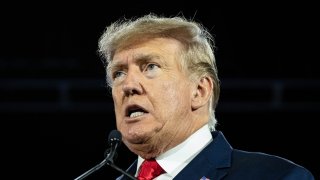
- The DOJ told a federal appeals court that Donald Trump has repeatedly failed to show that he declassified government records taken from his Florida home.
- The department is seeking to resume its review of records marked classified that were seized from Trump's Palm Beach resort Mar-a-Lago in an FBI raid.
- Special master Raymond Dearie had expressed skepticism toward Trump's lawyers on the issue of declassification.
Attorneys for Donald Trump have repeatedly failed to show that the former president declassified government records that were taken from his Florida home as part of a criminal investigation, the Department of Justice told a federal appeals court.
The Justice Department made that argument late Tuesday as it sought to resume its review of records marked classified that were seized from Trump's Palm Beach resort home Mar-a-Lago in an FBI raid last month.
We've got the news you need to know to start your day. Sign up for the First & 4Most morning newsletter — delivered to your inbox daily. >Sign up here.
The DOJ's filing in the U.S. Court of Appeals for the 11th Circuit swung back at Trump's lawyers, who earlier Tuesday asked the court to preserve a ruling from a lower federal judge that blocked the government from examining the seized documents.
Trump "again implies that he could have declassified the records before leaving office," federal prosecutors wrote.
"As before, however, Plaintiff conspicuously fails to represent, much less show, that he actually took that step," they wrote, referring to Trump.
Money Report
The DOJ lawyers added that Trump "is now resisting" a request by a court-appointed special master for him to provide evidence that he declassified records that were seized.
"In any event, Plaintiff's effort to raise questions about classification status is a red herring," the prosecutors argued. "Even if Plaintiff could show that he declassified the records at issue, there would still be no justification for restricting the government's use of evidence at the center of an ongoing criminal investigation."
U.S. District Judge Aileen Cannon had authorized the appointment of the special master, an independent third party who would review the thousands of records to identify personal items and information that could be protected by various legal privileges. As part of that ruling, Cannon temporarily stopped the DOJ from reviewing or using the seized material as part of its criminal investigation.
The DOJ appealed, asking the 11th Circuit to lift the part of Cannon's order barring it from using the government records bearing classification markings and requiring the government to disclose those records to the special master.
Lawyers for Trump and the DOJ appeared in Brooklyn, New York, on Tuesday afternoon for a conference with the special master, U.S. District Judge Raymond Dearie. He was picked for the role by Trump and appointed by Cannon, who herself had been nominated by Trump.
But in Tuesday's court conference, Dearie expressed skepticism toward Trump's lawyers about which, if any, of the seized Mar-a-Lago records had been declassified, NBC News reported.
The DOJ has presented "prima facie evidence" that the documents with classified markings are, in fact, classified, Dearie said. Unless Trump's lawyers could provide evidence to dispute that stance, "As far as I'm concerned, that's the end of it," Dearie said.
The FBI raided Mar-a-Lago on Aug. 8, seeking materials showing violations of laws against obstruction of justice and the removal of official records, as well as the U.S. Espionage Act.
The federal agents seized more than 100 documents with classified markings in that raid, the DOJ later revealed. Court documents also revealed that the FBI found four dozen empty folders marked "CLASSIFIED" during the raid. There are 11,000 documents at issue, Dearie said Tuesday.
Trump and his allies have argued in interviews and on social media that he declassified all the government records that were retrieved from Mar-a-Lago. But the ex-president's lawyers have not echoed that claim in court.
On Tuesday, they instead told the appeals court that the DOJ has not proven that the documents are classified, and asserted that a president "has absolute authority to declassify any information."
In a footnote, Trump's lawyers added, "The fact the documents contain classification markings does not necessarily negate privilege claims." They pointed to the fact that, according to the probable cause affidavit used to obtain the Mar-a-Lago search warrant, some documents with classified markings also include Trump's handwritten notes.
"Those notes could certainly contain privileged information," Trump's lawyers wrote.
In the appearance before the special master in Brooklyn federal court on Tuesday afternoon, Trump attorney James Trusty said, "We should not be in a position to have to disclose" declarations and witness statements about the classification issue, NBC reported.
Dearie replied, "My view is you can't have your cake and eat it."






